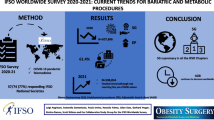Abstract
Laparoscopic sleeve gastrectomy (LSG) is a relatively new bariatric surgical procedure associated with an acceptable weight loss and a relatively low morbidity. There is existing evidence suggesting bariatric surgery resolves or improves hypertension. The purpose of this study is to systematically review the effect of LSG on hypertension. An electronic search method was primarily used for identification of the studies. We performed a comprehensive search of all electronic databases (MEDLINE, PubMed, Embase, Scopus, Dare, Clinical Evidence, BIOSIS, Previews, TRIP, Web of Science, Health Technology Database, Conference abstracts, clinical trials, and the Cochrane Library database) using broad search terms. All human studies from August 2000 to September 2011 were included. After an initial screening, a total of 326 studies were identified. After assessment of these studies based on our exclusion criteria, 222 studies were considered for the abstract review. A total of 33 studies were identified after a careful screening, involving a total of 3,997 patients. The mean pre-operative body mass index (BMI) was 49.1 ± 7.5 kg/m2 (range 37–68). The average follow-up time was 16.9 ± 9.8 months (range 12–48). The mean post-operative BMI was 36 ± 7.0 kg/m2 (range 25.6–54). LSG resulted in resolution of hypertension in 58% of patients. On average, 75% of patients experienced resolution or improvement of their hypertension. Based on our systematic review, LSG has a significant effect on hypertension, inducing resolution or improvement in the majority of cases. Therefore, LSG remains a viable surgical option in obese patients with hypertension.

Similar content being viewed by others
References
Haslam DW, James WP. Obesity. Lancet. 2005;366:1197–209.
Narkiewicz K. Obesity and hypertension—the issue is more complex than we thought. Nephrol Dial Transplant. 2006;21:264–7.
Buchwald H, Avidor Y, Braunwald E, et al. Bariatric surgery: a systematic review and meta-analysis. JAMA. 2004;292:1724–37.
Regan JP, Inabnet WB, Gagner M, et al. Early experience with two-stage laparoscopic Roux-en-Y gastric bypass as an alternative in the super-super obese patient. Obes Surg. 2003;13:861–4.
Han SM, Kim WW, Oh JH. Results of laparoscopic sleeve gastrectomy (LSG) at 1 year in morbidly obese Korean patients. Obes Surg. 2005;15:1469–75.
Gumbs AA, Gagner M, Dakin D, et al. Sleeve gastrectomy for morbid obesity. Obes Surg. 2007;17:962–9.
Kotchen TA. Obesity-related hypertension: epidemiology, pathophysiology, and clinical management. Am J Hypertens. 2010;23:1170–8.
Zhang R, Reisin E. Obesity and hypertension: the effects on cardiovascular and renal systems. Am J Hypertens. 2000;13:1308–14.
Rasouli N, Kern PA. Adipocytokines and the metabolic complications of obesity. J Clin Endocrinol Metab. 2008;93:S64–73.
Kehagias I, Karamanakos SN, Argentou M, et al. Randomized clinical trial of laparoscopic Roux-en-Y gastric bypass versus laparoscopic sleeve gastrectomy for the management of patients with BMI <50 kg/m2. Obes Surg. 2011;21:1650–6.
Iannelli A, Anty R, Schneck AS, et al. Inflammation, insulin resistance, lipid disturbances, anthropometrics, and metabolic syndrome in morbidly obese patients: a case control study comparing laparoscopic Roux-en-Y gastric bypass and laparoscopic sleeve gastrectomy. Surgery. 2011;149:364–70.
Almogy G, Crookes PF, Anthone GJ. Longitudinal gastrectomy as a treatment for the high-risk super-obese patient. Obes Surg. 2004;14:492–7.
Bobowicz M, Lehmann A, Orlowski M, et al. Preliminary outcomes 1 year after laparoscopic sleeve gastrectomy based on Bariatric Analysis and Reporting Outcome System (BAROS). Obes Surg. 2011;21:1843–8.
Braghetto I, Korn O, Valladares H, et al. Laparoscopic sleeve gastrectomy: surgical technique, indications and clinical results. Obes Surg. 2007;17:1442–50.
Chowbey PK, Dhawan K, Khullar R, et al. Laparoscopic sleeve gastrectomy: an Indian experience—surgical technique and early results. Obes Surg. 2010;20:1340–7.
Cottam D, Qureshi FG, Mattar SG, et al. Laparoscopic sleeve gastrectomy as an initial weight-loss procedure for high-risk patients with morbid obesity. Surg Endosc. 2006;20:859–63.
D’Hondt M, Vanneste S, Pottel H, et al. Laparoscopic sleeve gastrectomy as a single-stage procedure for the treatment of morbid obesity and the resulting quality of life, resolution of comorbidities, food tolerance, and 6-year weight loss. Surg Endosc. 2011;25:2498–504.
Hamoui N, Anthone GJ, Kaufman HS, et al. Sleeve gastrectomy in the high-risk patient. Obes Surg. 2006;16:1445–9.
Han SM, Kim WW, Oh JH. Results of laparoscopic sleeve gastrectomy (LSG) at 1 year in morbidly obese Korean patients. Obes Surg. 2005;15:1469–75.
Kasalicky M, Michalsky D, Housova J. Laparoscopic sleeve gastrectomy without an over-sewing of the staple line. Obes Surg. 2008;18:1257–62.
Leivonen MK, Juuti A, Jaser N, et al. Laparoscopic sleeve gastrectomy in patients over 59 years: early recovery and 12-month follow-up. Obes Surg. 2011;21:1180–7.
Magee CJ, Barry J, Arumugasamy M, et al. Laparoscopic sleeve gastrectomy for high-risk patients: weight loss and comorbidity improvement: short-term results. Obes Surg. 2011;21:547–50.
Menenakos E, Stamou KM, Albanopoulos K, et al. Laparoscopic sleeve gastrectomy performed with intent to treat morbid obesity: a prospective single-center study of 261 patients with a median follow-up of 1 year. Obes Surg. 2010;20:276–82.
Nienhuijs SW, de Zoete JP, Berende CAS, et al. Evaluation of laparoscopic sleeve gastrectomy on weight loss and co-morbidity. Int J Surg. 2010;8:302–4.
Ou Yang O, Loi K, Liew V. Staged laparoscopic sleeve gastrectomy followed by Roux-en-Y gastric bypass for morbidly obese patients: a risk reduction strategy. Obes Surg. 2008;18:1575–80.
Ramalingam G, Anton CKS. Our 1-year experience in laparoscopic sleeve gastrectomy. Obes Surg. 2011;21:1828–33.
Sammour T, Hill AG, Singh P, et al. Laparoscopic sleeve gastrectomy as a single-stage bariatric procedure. Obes Surg. 2010;20:271–5.
Sánchez-Santos R, Masdevall C, Baltasar A, et al. Short- and mid-term outcomes of sleeve gastrectomy for morbid obesity: the experience of the Spanish national registry. Obes Surg. 2009;19:1203–10.
Silecchia G, Boru C, Pecchia A, et al. Effectiveness of laparoscopic sleeve gastrectomy (first stage of biliopancreatic diversion with duodenal switch) on co-morbidities in super-obese high-risk patients. Obes Surg. 2006;16:1138–44.
Todkar JS, Shah SS, Shah PS, et al. Long-term effects of laparoscopic sleeve gastrectomy in morbidly obese subjects with type 2 diabetes mellitus. Surg Obes Relat Dis. 2010;6:142–5.
Weiner RA, Weiner S, Pomhoff I, et al. Laparoscopic sleeve gastrectomy—influence of sleeve size and resected gastric volume. Obes Surg. 2007;17:1297–305.
Abbatini F, Rizzello M, Casella G, et al. Long-term effects of laparoscopic sleeve gastrectomy, gastric bypass, and adjustable gastric banding on type-2 diabetes. Surg Endosc. 2010;24:1005–10.
Atkins ER, Preen DB, Jarman C, et al. Improved obesity reduction and co-morbidity resolution in patients treated with 40-French bougie versus 50-French bougie four years after laparoscopic sleeve gastrectomy. Analysis of 294 patients. Obes Surg. 2011;22:97–104.
Basso N, Capoccia D, Rizzello M, et al. First-phase insulin secretion, insulin sensitivity, ghrelin, GLP-1, and PYY changes 72 h after sleeve gastrectomy in obese diabetic patients: the gastric hypothesis. Surg Endosc. 2011;25:3540–50.
Basso N, Casella G, Rizzello M, et al. Laparoscopic sleeve gastrectomy as first stage or definitive intent in 300 consecutive cases. Surg Endosc. 2011;25:444–9.
Benaiges D, Goday A, Ramon JM, et al. Laparoscopic sleeve gastrectomy and laparoscopic gastric bypass are equally effective for reduction of cardiovascular risk in severely obese patients at one year of follow-up. Surg Obes Relat Dis. 2011;7:575–80.
Hutter MM, Schirmer BD, Jones DB, et al. First report from the American College of Surgeons bariatric surgery center network. Ann Surg. 2011;254:410–22.
Kasama K, Tagaya N, Kanahira E, et al. Has laparoscopic bariatric surgery been accepted in Japan? The experience of a single surgeon. Obes Surg. 2008;18:1473–8.
Lakdawala MA, Bhasker A, Mulchandani D, et al. Comparison between the results of laparoscopic sleeve gastrectomy and laparoscopic Roux-en-Y gastric bypass in the Indian population: a retrospective 1 year study. Obes Surg. 2010;20:1–6.
Leyba JL, Aulestia SN, Llopis SN. Laparoscopic Roux-en-Y gastric bypass versus laparoscopic sleeve gastrectomy for the treatment of morbid obesity. A prospective study of 117 patients. Obes Surg. 2011;21:212–6.
Mohos E, Schmaldienst E, Prager M. Quality of life parameters, weight change and improvement of co-morbidities after laparoscopic Roux Y gastric bypass and laparoscopic gastric sleeve resection—comparative study. Obes Surg. 2011;21:288–94.
Omana JJ, Nguyen SQ, Herron D, et al. Comparison of comorbidity resolution and improvement between laparoscopic sleeve gastrectomy and laparoscopic adjustable gastric banding. Surg Endosc. 2010;24:2513–7.
Aneja A, El-Atat F, McFarlane SI, et al. Hypertension and obesity. Rec Prog Horm Res. 2004;169–205.
Sjostrom CD, Lissner L, Wedel H, et al. Reduction in incidence of diabetes, hypertension and lipid disturbances after intentional weight loss induced by bariatric surgery: the SOS Intervention Study. Obes Res. 1999;7:477–84.
Disclosures
The authors do not have any commercial associations that might be a conflict of interest in relation to this article.
Author information
Authors and Affiliations
Corresponding author
Rights and permissions
About this article
Cite this article
Sarkhosh, K., Birch, D.W., Shi, X. et al. The Impact of Sleeve Gastrectomy on Hypertension: A Systematic Review. OBES SURG 22, 832–837 (2012). https://doi.org/10.1007/s11695-012-0615-2
Published:
Issue Date:
DOI: https://doi.org/10.1007/s11695-012-0615-2




